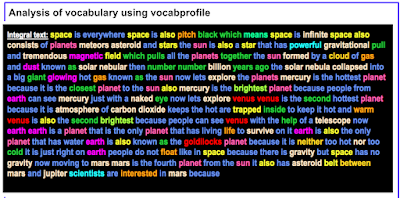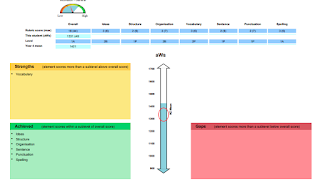As I had focused on vocabulary for the purpose of my inquiry, I needed to monitor if vocabulary of my students had improved. I did this through Kids Vocabprofile, a tool that can help assess vocabulary knowledge. The analyses of writing shows that students have learnt lots of new words and can use these in their writing in a meaningful way. There is a clear indication that student's vocabulary bank has increased.
Analysis of vocabulary using vocabprofile
Student Name : D
Target student 1 - Time 1
8 topic specific words used.
Target student 1, Time 2
28 topic related words used.
Target student 1, Time 3
74 topic related words used
_______________________________________
Student Name: O
Target student 2
Time 1
The solar system has planets. Mars is the hottest planet.
2 words
Time 2
The sun lies at the centre of the solar system where it is by far the largest object.
It holds 99.8 of the mass of the solar system. The sun and it’s atmosphere are divided into
several layers. The sun’s light is made out of rainbow colours.
17 words
Time 3
Earth is the third planet in the Solar System. It is the most unique planet out of all the
other planets.People can live on Earth and there is water and oxygen that can grow plants.
It is called the goldilocks planet and is the perfect planet for human beings to survive.
Earth has one moon. There are lots of other heavenly bodies in the solar system like
the moons and shooting stars. There are some planets that are not discovered.
We cannot live on other planets because there is no oxygen and no water. Other planets
are too cold or too hot.
18 words
Student Name: X
Target Student 3
Time 1
What do you know about the solar system.
Solar system is a clelltion ( collection) of planets and smaller objects all travelling around the
senstrel ( central) star the sun. it is big and heavy that it’s gravity pulls the whole solar system
to orbit around the sun. Solar means something to do with the sun. the solar system is colletion
of 8 planets more than hundred moons.
11 words
Time 2
Space is everywhere. In space it is pitch black alos space has millions of galaxy in spaces too.
Space has no oxygen so that’s why astronauts wear space suits and helmets with an oxygen tank.
Space never ends so it is infinite. Scientists are unaware of the possibilities in space.
15 words
Time 3
Topic - Caring for Planet Earth
Earth was created when a solar nebula explosion happened wich created the sun that also
created all the other planets and Earth. Earth is a goldilocks planet because it is neither too
hot nor too cold. It has the right temperature because it has two elements oxygen and water to survive.
Animals also other creatures are dying because people are cutting down trees, littering hunting
down animals because sometimes the rubbish goes on animals. Then they die, like seas turtles,
cows, bulls, penguins shark fish. Killer whales alos whales mostly sharks because they eat whatever
they can find. also some animals lives in trees. That’s how animal lives get harder for them.
But we still need wood to make things so always after cutting down trees plant a new one.
Nether litter and don’t hunt.
19 words
Student Name: J
Target student 4
Time 1
A solar system have 8 planets. Earth is unique because we have oxygen.
2 words
Time 2
Our Solar system has 8 planets and 1 sun and lots of moons. There are other heavenly bodies
known as shooting stars and meteors. There is a possibility of different planets and galaxies
beyond the milky way galaxy. There could be aliens and mermaids and other species that we
are unaware of.
Earth is the most suitable planet to live in. We cannot live in other planets because are too
cold or too hot. Some planets have no oxygen and no water. We cannot live on gaseous planets
because they would blow us up. Other planets have no seasons and have too long days and too
long nights. So Earth is the only planet you can live on.
13 words
Time 3
Our Solar system has eight planets and one sun and lots of moons. There are other heavenly bodies
known as shooting stars and meteors. There is a possibility of different planets and galaxies
beyond the milky way galaxy. There could be aliens and mermaids and other species that
we are unaware of. Earth is the most suitable planet to live in. We cannot live in other planets
because other planets are too cold or too hot. Some planets have no oxygen or no water.
We cannot live on gaseous planets because it would blow us up. Other planets have no seasons
and have days and nights that are too long. So Earth is the only planet you can live on.
Earth has one moon and the right temperature for life to survive. It has a number of species
and this is what makes it a beautiful planet.
24 words























